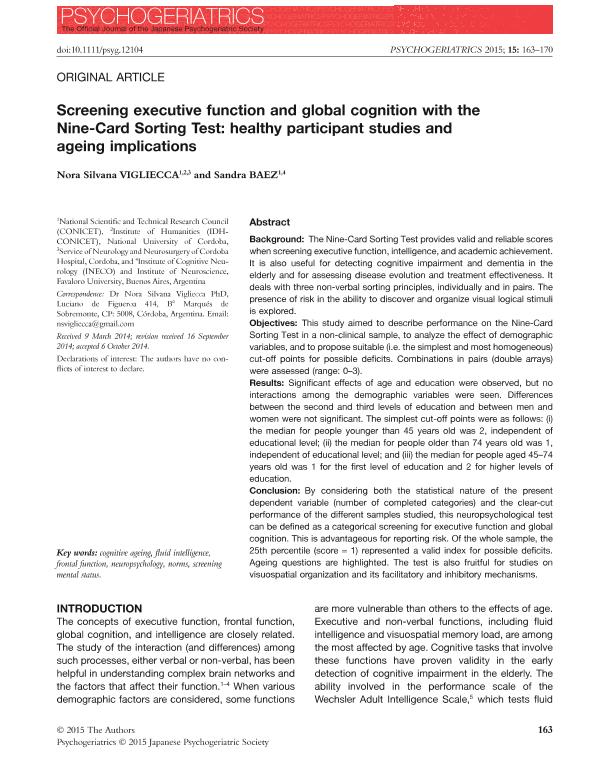Mostrar el registro sencillo del ítem
dc.contributor.author
Vigliecca, Nora Silvana

dc.contributor.author
Báez Buitrago, Sandra Jimena

dc.date.available
2017-09-21T20:31:37Z
dc.date.issued
2015-03
dc.identifier.citation
Vigliecca, Nora Silvana; Báez Buitrago, Sandra Jimena; Screening executive function and global cognition with the Nine-Card Sorting Test: healthy participant studies and ageing implications; Wiley; Psychogeriatrics; 15; 3; 3-2015; 163-170
dc.identifier.issn
1346-3500
dc.identifier.uri
http://hdl.handle.net/11336/24855
dc.description.abstract
Background: The Nine-Card Sorting Test provides valid and reliable scores when screening executive function, intelligence, and academic achievement. It is also useful for detecting cognitive impairment and dementia in the elderly and for assessing disease evolution and treatment effectiveness. It deals with three non-verbal sorting principles, individually and in pairs. The presence of risk in the ability to discover and organize visual logical stimuli is explored. Objectives: This study aimed to describe performance on the Nine-Card Sorting Test in a non-clinical sample, to analyze the effect of demographic variables, and to propose suitable (i.e. the simplest and most homogeneous) cut-off points for possible deficits. Combinations in pairs (double arrays) were assessed (range: 0–3). Results: Significant effects of age and education were observed, but no interactions among the demographic variables were seen. Differences between the second and third levels of education and between men and women were not significant. The simplest cut-off points were as follows: (i) the median for people younger than 45 years old was 2, independent of educational level; (ii) the median for people older than 74 years old was 1, independent of educational level; and (iii) the median for people aged 45–74 years old was 1 for the first level of education and 2 for higher levels of education. Conclusion: By considering both the statistical nature of the present dependent variable (number of completed categories) and the clear-cut performance of the different samples studied, this neuropsychological test can be defined as a categorical screening for executive function and global cognition. This is advantageous for reporting risk. Of the whole sample, the 25th percentile (score = 1) represented a valid index for possible deficits. Ageing questions are highlighted. The test is also fruitful for studies on visuospatial organization and its facilitatory and inhibitory mechanisms.
dc.format
application/pdf
dc.language.iso
eng
dc.publisher
Wiley

dc.rights
info:eu-repo/semantics/openAccess
dc.rights.uri
https://creativecommons.org/licenses/by-nc-sa/2.5/ar/
dc.subject
Cognitive Aging
dc.subject
Screening Mental Status
dc.subject
Neuropsychology
dc.subject
Norms
dc.subject.classification
Otras Psicología

dc.subject.classification
Psicología

dc.subject.classification
CIENCIAS SOCIALES

dc.title
Screening executive function and global cognition with the Nine-Card Sorting Test: healthy participant studies and ageing implications
dc.type
info:eu-repo/semantics/article
dc.type
info:ar-repo/semantics/artículo
dc.type
info:eu-repo/semantics/publishedVersion
dc.date.updated
2017-06-12T20:29:49Z
dc.journal.volume
15
dc.journal.number
3
dc.journal.pagination
163-170
dc.journal.pais
Estados Unidos

dc.journal.ciudad
Hoboken
dc.description.fil
Fil: Vigliecca, Nora Silvana. Consejo Nacional de Investigaciones Científicas y Técnicas. Centro Científico Tecnológico Conicet - Córdoba. Instituto de Humanidades. Universidad Nacional de Córdoba. Instituto de Humanidades; Argentina
dc.description.fil
Fil: Báez Buitrago, Sandra Jimena. Consejo Nacional de Investigaciones Científicas y Técnicas. Oficina de Coordinación Administrativa Houssay. Instituto de Neurociencia Cognitiva. Fundación Favaloro. Instituto de Neurociencia Cognitiva; Argentina
dc.journal.title
Psychogeriatrics

dc.relation.alternativeid
info:eu-repo/semantics/altIdentifier/doi/http://dx.doi.org/10.1111/psyg.12104
dc.relation.alternativeid
info:eu-repo/semantics/altIdentifier/url/http://onlinelibrary.wiley.com/doi/10.1111/psyg.12104/abstract
Archivos asociados
